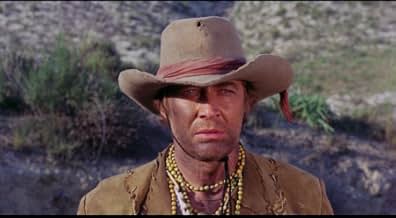At the beginning of the movie, Bart (Corrado Pani) is about to be hanged. With a grin, he sticks his head through the noose. Soon we see the reason for his happiness: bandits attack the town and rescue him. Bart watches a widow (probably of his latest victim) shoot herself after he kissed her, but he doesn't care at all. Later he murders his rescuers in cold blood and teams up with Theo (Antonio Salines) and Philip (Luis Davila). They arrive in Benson City, a ghost town, and meet Philip's love interest Mary (Claudia Gravy). They steal a box full of gold from a stagecoach - Bart, the protagonist so far, is casually shot there - and hide in the deserted town again for a couple of days. But Theo, Philip and Mary are not alone. The last inhabitant, the old Mrs Benson, still lives there, and Ray (Lou Castel), a boyish stranger, arrives with a woman who survived an accident in the desert. When Mrs Benson offers Ray a gun to fight against the bandits, he tells her he never fired a gun before... but he's got boomerangs.
"Matalo" is not just a movie - it's an unforgettable experience. Directed by Cesare Canevari, Mario Migliardi had the freedom to experiment with the soundtrack which has many distorted strange noises and a psychedelic guitar playing which is obviously contemporary to Jimi Hendrix. You can count the dialog scenes in the movie by the fingers of one hand. Even if people talk, it is often not a convenient exchange of information for the audience, but a meaningless distraction, for example in the scene when Mary teases Theo by showing her leg, while Philip boasts about all the gold they stole.
Bart says: "It is easier to love God than your next one, because God doesn't cheat" (in the original: "E più facile amare Dio che il prossimo perché Dio non ti frega mai"). Bart is often laughing to himself, as if he told a secret joke to himself - more likely, he is amused at the absurdity of his existence.
If somebody shoots, it's not the aim, it's the sensuality of the action that matters. Bart loves to smell the smoke of his gun after he fired. Before the stagecoach robbery, Bart and Philip don't discuss their plan like they would do in an ordinary movie. Often it is not important what is shown, but what is not shown, because that questions your habits as a viewer. After Julio Ortas' camera turned in circles, we see bodies on the ground. Who killed whom? Never mind. We all must die. God doesn't cheat.












